The new leader of UNICEF says the children's agency is taking a new approach in 2018 by engaging with private companies to help prepare young people for productive lives.
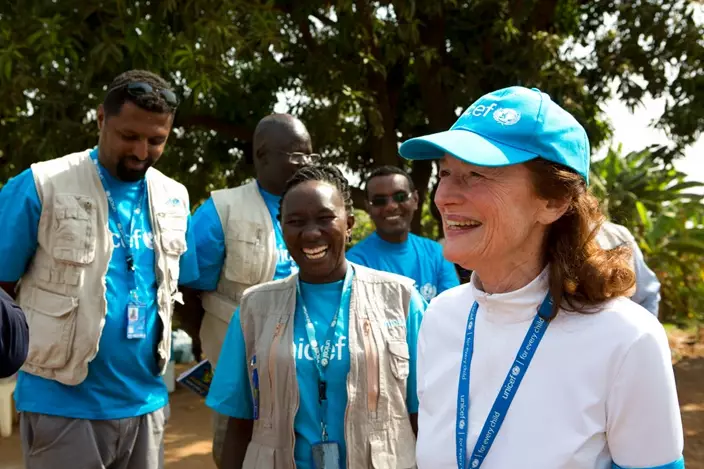
In this photo taken Wednesday, Jan. 17, 2018, UNICEF's recently appointed Executive Director Henrietta Holsman Fore, right, speaks with staff members at the Nile Water Programme site in Juba, South Sudan. (Karel Prinsloo/UNICEF via AP)
In an interview with The Associated Press, executive director Henrietta Holsman Fore said she plans to draw on her experience in the business and development worlds. The American was the first woman to lead the U.S. Agency for International Development and was CEO of Holsman International, an investment and management firm.
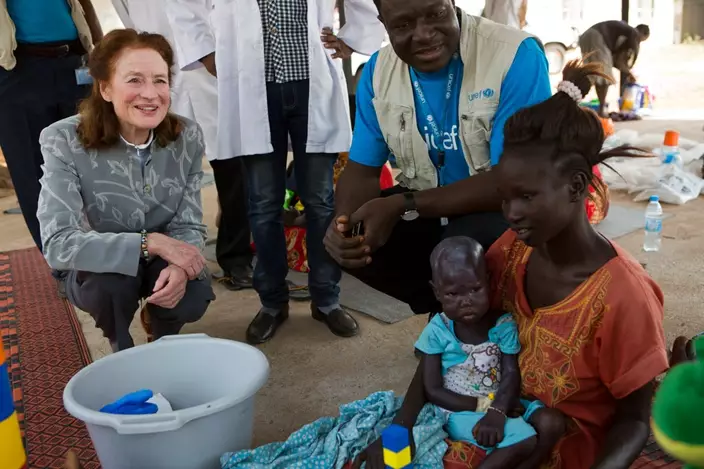
In this photo taken Wednesday, Jan. 17, 2018, UNICEF's recently appointed Executive Director Henrietta Holsman Fore, left, speaks to patients at the Al Sabbah hospital where UNICEF is implementing a nutrition programme in Juba, South Sudan. (Karel Prinsloo/UNICEF via AP)
"I would hope that we can cross over and try to take the best from each other and scale it up for the people that we serve, as we serve children and children need everything," Fore told the AP during a visit to South Sudan this week.
She chose the civil war-torn nation for her first international trip since taking over the U.N. agency at the start of the year because South Sudan is where aid workers face the greatest risk worldwide. At least 28 aid workers were killed in the East African nation last year, according to figures released by the U.N. this week.
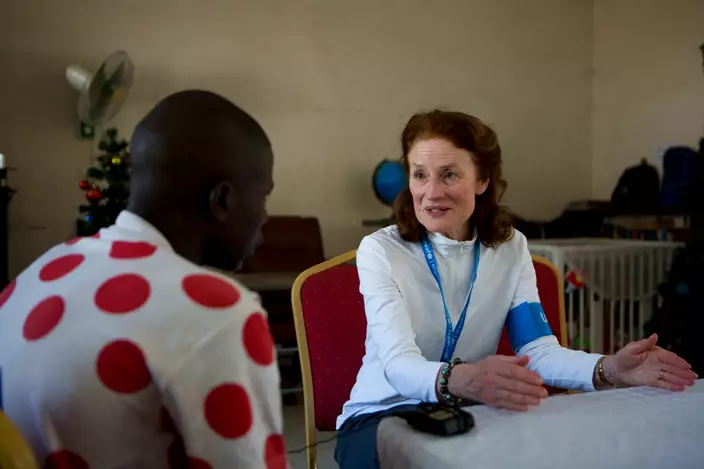
In this photo taken Wednesday, Jan. 17, 2018, UNICEF's recently appointed Executive Director Henrietta Holsman Fore speaks to a demobilised child soldier at the Confident Children out of Conflict Centre in Juba, South Sudan. (Karel Prinsloo/UNICEF via AP)
Fore urged South Sudan President Salva Kiir to make the country's people his "first priority" and called the country's dire situation "a crisis for children."
South Sudan's civil war, now in its fifth year, has killed tens of thousands and displaced millions. Children have borne the brunt of the conflict.
"The fighting shows no sign of abating and the humanitarian needs are massive," Fore said in a statement Friday at the end of her visit. "2.4 million children have been forced to flee their homes. More than a quarter of a million children are severely malnourished and at imminent risk of death. Over 19,000 children have been recruited into the conflict.
"At least one in three schools has been damaged, destroyed, occupied or closed. And we have documented more than 1,200 cases of sexual violence against children. The numbers go on and on."
Over 70 percent of children are out of school, the highest proportion of children without education in the world, according to the U.N.
The combination of an illiterate generation with one that's been severely displaced means that "you've lost them twice," Fore said. "You lose them to education and you lose them to life skills. You're impoverishing a nation."
Fore said she plans to launch new initiatives to focus on the "second decade of life," or children between the ages of 10 and 18. Her idea is to use education and work programs including local and multinational companies that can bring children into their work and teach them skills.
UNICEF is the U.N.'s second-largest agency, with a budget of about $5 billion in 2017.
PORT-AU-PRINCE, Haiti (AP) — Gangs have intensified their rampage in the downtown area of Haiti’s capital, setting fire to a school and looting pharmacies across the road from the country’s largest public hospital.
The attacks that began Monday and continued into early Tuesday mark nearly a month since gunmen began targeting key infrastructure across Port-au-Prince including police stations, the main international airport that remains closed and Haiti’s two biggest prisons, releasing more than 4,000 inmates.
“The violence and instability in Haiti have consequences far beyond the risk of the violence itself,” Catherine Russell, UNICEF’s executive director, said in a statement Tuesday. “The situation is creating a child health and nutrition crisis that could cost the lives of countless of children.”
The number of children in Haiti estimated to suffer from severe acute malnutrition has increased by 19% this year, according to UNICEF. In addition, some 1.64 million people are on the precipice of famine.
“This malnutrition crisis is entirely human made,” Russell said.
Violence has forced the closure of roads and certain hospitals and prevented aid groups from delivering critical supplies at a time they are needed the most.

Children play on a slip-and-slide at a shelter for families displaced by gang violence, in Port-au-Prince, Haiti, Friday, March 22, 2024. (AP Photo/Odelyn Joseph)
Only two of five hospitals in Haiti are operational across the country, according to UNICEF. In addition, the violence in Port-au-Prince has prevented the distribution of health and nutrition supplies for at least 58,000 children who are severely wasted, the agency said.
Meanwhile, members of a regional trade bloc known as Caricom have pushed to accelerate the formation of a transitional presidential council in hopes it could soon help quell the ongoing violence.
The council would be responsible for choosing a new prime minister and a council of ministers. Prime Minister Ariel Henry, who was locked out of Haiti when the attacks began, has said he would resign once the council is created.
However, multiple setbacks continue to delay formation of the council, which will be composed of nine members, seven of them with voting powers.
On Monday, René Jean Jumeau, who was nominated to represent Haiti’s religious sector in a non-voting position, resigned.
“The need for concrete action is too strong to remain helpless in the posture of spectator,” he said in a letter addressed to the council.
Meanwhile, Col. Himmler Rébu, a former colonel of Haiti’s army and president of the Grand Rally for the Revolution of Haiti, a party that obtained a seat on the council, told Radio RFM 104.9 on Tuesday that he believes the council will fail.
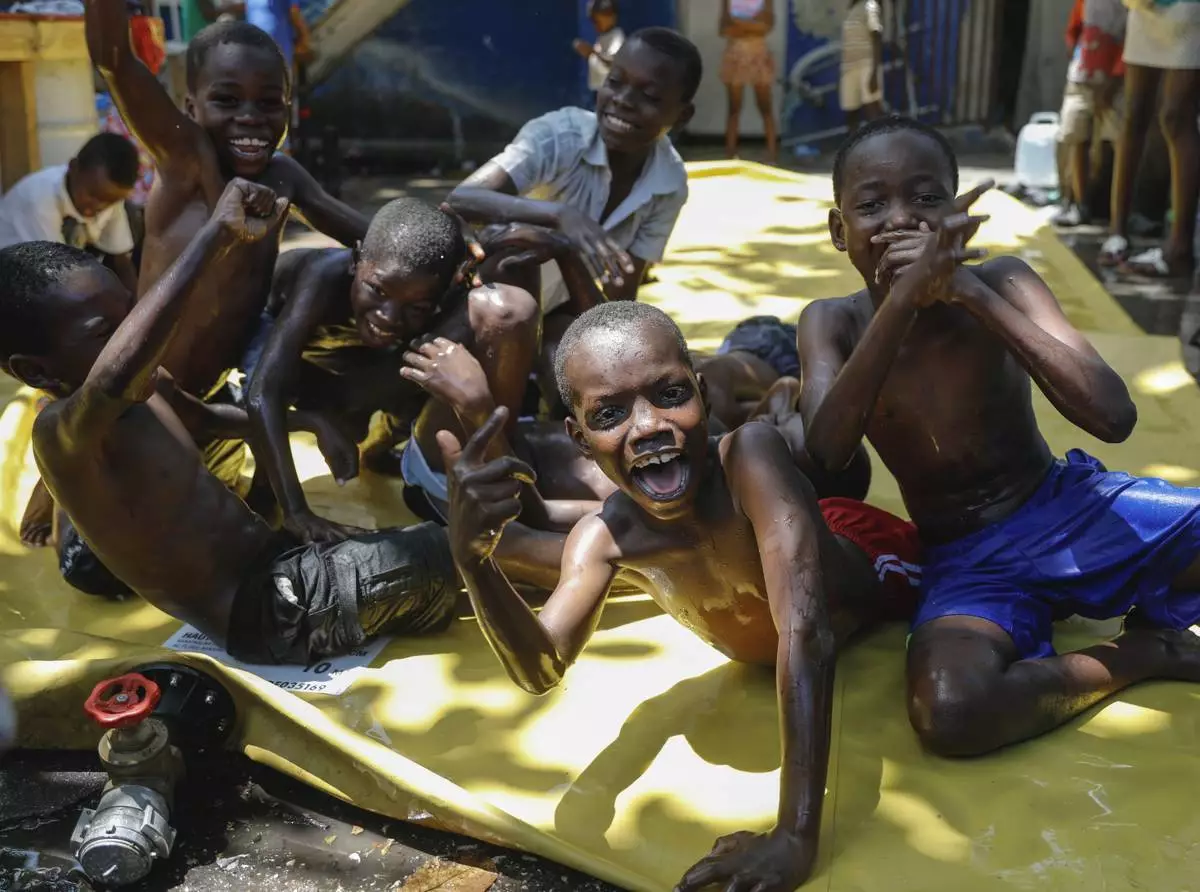
Children react to the camera as they play on a slip-and-slide at a shelter for families displaced by gang violence, in Port-au-Prince, Haiti, Friday, March 22, 2024. (AP Photo/Odelyn Joseph)
Rébu said officials should just move quickly to Plan B, which he said should involve granting powers to a judge from Haiti’s Supreme Court to select the country’s new leaders.
Supporters of that plan include the Protestant Federation of Haiti. It issued a statement on Monday backing the selection of a Supreme Court judge who would serve as interim president and help choose a prime minister.
Caribbean officials said no additional meetings with nominated council members are planned for the week since they have asked for more time to work through various unidentified internal issues.
Associated Press reporter Bert Wilkinson in Georgetown, Guyana, contributed to this report.
Follow AP’s coverage of Latin America and the Caribbean at https://apnews.com/hub/latin-america
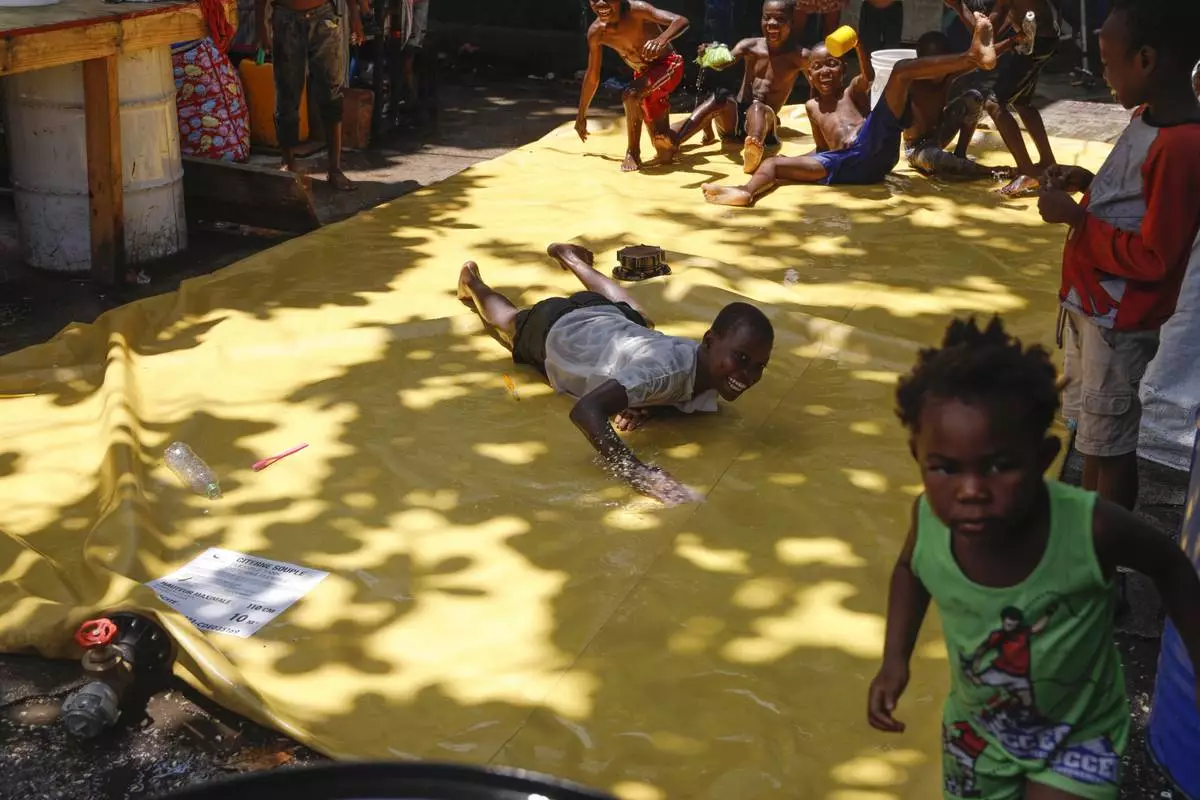
Children play on a slip-and-slide at a shelter for families displaced by gang violence, in Port-au-Prince, Haiti, Friday, March 22, 2024. (AP Photo/Odelyn Joseph)
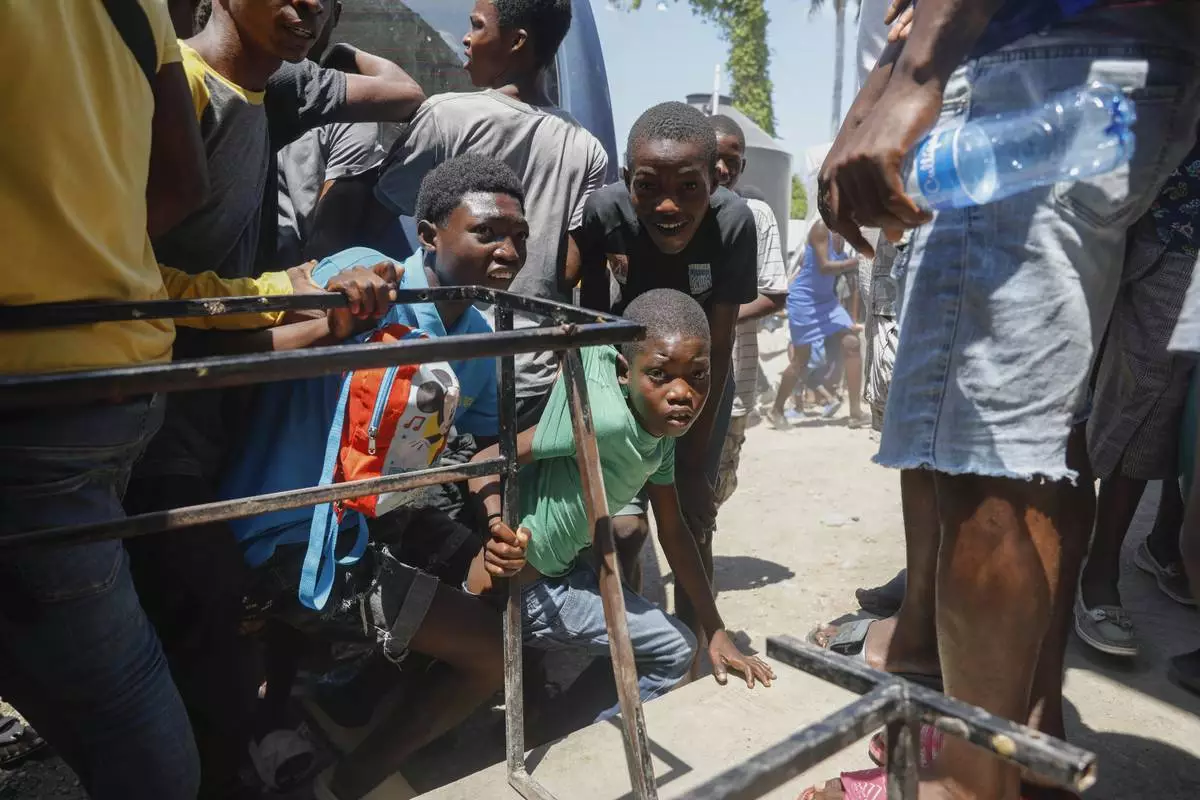
Youth take cover after hearing gunshots at a public school that serves as a shelter for people displaced by gang violence, in Port-au-Prince, Haiti, Friday, March 22, 2024. (AP Photo/Odelyn Joseph)
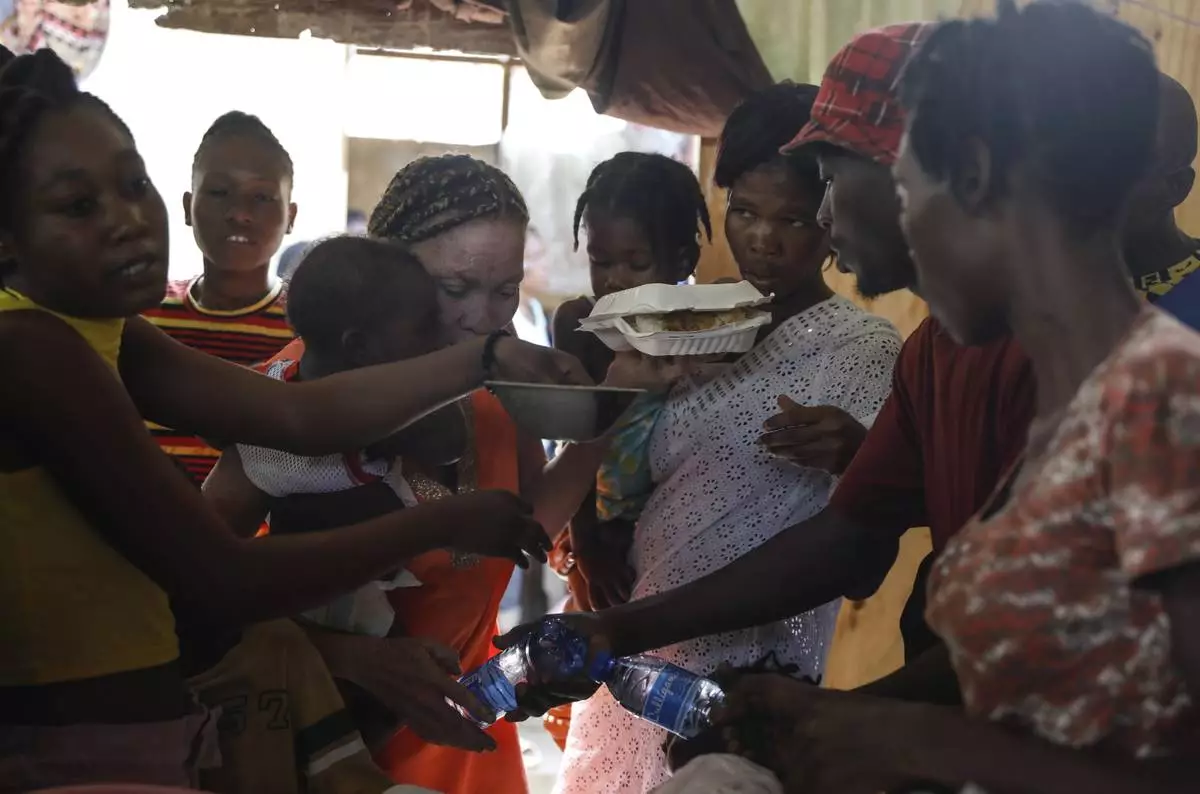
Women scuffle for plates of food for their children at a shelter for families displaced by gang violence, in Port-au-Prince, Haiti, Friday, March 22, 2024. (AP Photo/Odelyn Joseph)










